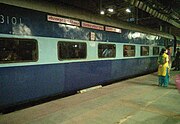ICF coach
| Integral Coach Factory (ICF) coach | |
|---|---|
 Yellow ("utkrish" livery) and blue ("bleeding blue" livery) ICF coaches | |
| Designer | Swiss Car & Elevator Manufacturing Co |
| Built at | |
| Constructed | 1955–2018 |
| Scrapped | c.2000s–2009 (PNR) |
| Number scrapped | 30 (PNR) |
| Successor |
|
| Operator(s) |
|
| Specifications | |
| Car body construction | Corten Steel |
| Car length | 22,297 millimetres (22.297 m) including buffers |
| Width | 3,245 millimetres (3.245 m) |
| Height | 4,025 millimetres (4.025 m) |
| Floor height | 1,313 millimetres (1.313 m) |
| Wheelbase | 14,783 millimetres (14.783 m) |
| Maximum speed | 130 km/h (81 mph) |
| Bogies | ICF Bogies |
| Minimum turning radius | 152.4 m |
| Coupling system | Buffers and chain coupler, AAR H Type Tightlock CBC coupling |
| Track gauge | 1,676 mm (5 ft 6 in) |
The Integral Coach Factory (ICF) coach is a conventional passenger coach used on the majority of Indian Railways (IR) lines.[1] The Philippine National Railways (PNR) was a previous user of the cars, but retired the last of them in 2009.[1]
Indian railways is currently phasing out ICF coaches and replacing them with newer LHB coaches are expected to address many of these issues.[1][2][3]
History[edit]
The design of the coach was developed by Integral Coach Factory, Perambur, Chennai, India in collaboration with the Swiss Car & Elevator Manufacturing Co, Schlieren, Switzerland in the 1950s.[citation needed] The design is also called the Schlieren design based on the location of the Swiss company.[citation needed]
The 1st ICF coach had been flagged by then Prime Minister Jawaharlal Nehru on 2 October 1955. The last ICF coach was flagged off by senior technician Shri Bhaskar P. in the presence of Railway Board Chairman Ashwani Lohani on 19 January 2018.[3]
Image gallery[edit]
See also[edit]
- Bo-Bo – The wheel arrangement of ICF coaches as per the UIC classification
References[edit]
- ↑ 1.0 1.1 1.2 "DNA Exclusive: Is It Time for Indian Railways to Tear Up Ageing Tracks and Old Machinery?". ZeeNews.India.com. Zee Media Corporation. 14 January 2022. Retrieved 6 June 2023.
- ↑ Ayyappan, V. (4 January 2021). "Leakage Found in ICF Coaches". The Times of India. Retrieved 6 June 2023.
- ↑ 3.0 3.1 Debroy, Bibek (9 February 2018). "A 70-Year-Old Vs a 30-Year-Old: LHB Coaches Perform Better than ICF Ones". Business Standard. Retrieved 6 June 2023.



